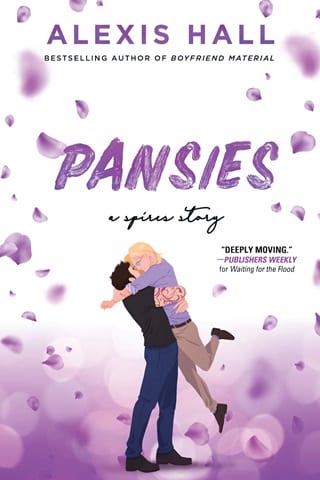Chapter Twenty
Chapter Twenty
1 . Paragraph begins with: Then his dad asked, “Shower alreet?”
Alexis: This is such a certain-type-of-dad thing. Will ask about the functionality of a stranger’s shower before you.
2 . Paragraph begins with: “Does the engine crank?” his dad asked suddenly.
Alexis: I think his dad, like his mum, is really trying. They’re just not succeeding . Which is what makes this so fucking painful.
3 . Paragraph begins with: “What’s a normal life, Da?”
Alexis: Alfie has learned . I am proud of this fictional bloke I wrote. Yeesh.
4 . Paragraph begins with: Alfie picked up his impromptu toolbox.
Alexis: Needless to say, this is deliberately ambiguous. I genuinely don’t think reaching out to your parents in this way is easy or quick, I don’t think one speech can change a lifetime of assumptions and values (an idea I come back to fairly regularly when it comes to protagonists and their families). But I personally feel that Alfie made a difference here. I think his dad got maybe not “it” but some of it. And “let us know if it’s the transmission” is, from a certain point of view, northern working-class man for “I love you.”
5 . Paragraph begins with: “I made you tea. I didn’t spit in it.”
Alexis: Clearly I was enjoying the fuck out of writing Gothshelley.
6 . Paragraph begins with: “Yeah, I stole it from St. Bede’s.”
Alexis: I did actually have a mug like this once, stolen from the Catholic Chaplaincy in Oxford. They went hard with their mugs over there.
7 . Paragraph begins with: “Um, yeah, is there another mechanic around?”
Alexis: Okay, Alfie may have done some learning. But he still has plenty of learning to do.
8 . Paragraph begins with: “I’ll go ring a taxi,” said Alfie.
Alexis: So one of the fascinating things about Geordie—why, as a dialect, it’s so rich—is that it has strong Danish and Norwegian influences on account of the Viking raids.
Hyem (pronounced kind of like yem ) is similar to the Danish hjem and derives from the Old Danish hēm which in turn is from the Old Norse heimr . Home, by contrast, which is the more common term in the south and in standard English, is from the Middle English hōm (itself from Old English hām ).
This piece of linguistic history sometimes gets disputed (the Vikings didn’t actually settle anywhere along the Tyne, so it’s hard to demonstrate a direct linguistic link via dialectal terms), but it’s also possible that hyem spread from Cumbria (which did have some relatively short-lived Viking settlements) or else it got picked up from Dutch sailors coming into port.
Either way, it’s a notable feature of Geordie that stands distinct from standard/southern English. You can also find it in the nursery rhyme/folksong “Bobby Shaftoe,” where the line mis-transliterated as “he’ll come back and marry me” is, in its northern form, “he’ll come hyem and marry me.”
9 . Paragraph begins with: “I don’t know. I don’t know.”
Alexis: In the same way I didn’t just want Alfie and Fen’s past to disappear or get checked off as fixed, I didn’t want Fen’s grief to vanish off-page. Because, in my experience, that’s not how grief works. And for all Fen feels he’s had “enough” time and should be over it, he’s still so close to the emotional epicentre: a year is nothing to grief. So here’s a moment where grief catches him unaware again.
In terms of what you might call the, err, journey of Fen’s grief, I was trying to mirror A Grief Observed to some degree—i.e., that he doesn’t get over it or move beyond it, but he’s able to accept it and begin to live with it.
10 . Paragraph begins with: “The Seafood Temple.”
Alexis: By the way, Colmans Seafood Temple is a really lovely restaurant. It’s got these floor-to-ceiling glass windows that look out over the beach and the sea, so you’ll catch a truly glorious sunset if you go at the right time.
11 . Paragraph begins with: “I’m norra homophobe.”
Alexis: As apologies go, it’s probably a good job Pete can’t play the ukulele.
 Fullepub
Fullepub 



